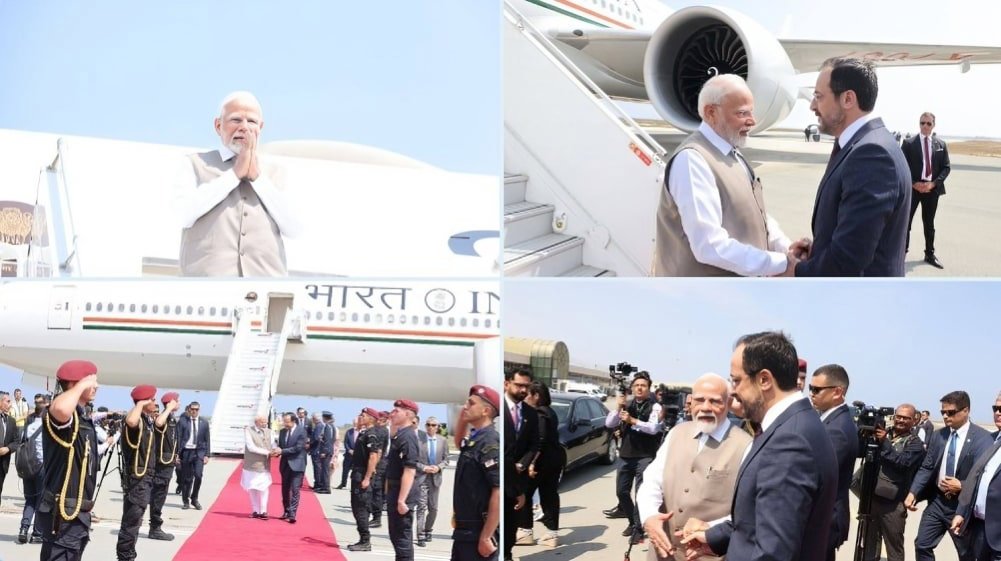Becoming the first Indian Prime Minister to visit Cyprus in 23 years, Prime Minister Narendra Modi arrived in the Mediterranean island nation on Sunday, where he was welcomed at the airport by President Nikos Christodoulides.
Appreciating this “special gesture” of being greeted at the airport, Modi remarked, “This visit will significantly enhance India-Cyprus relations, particularly in sectors such as trade, investment, and beyond.”
The two parties are anticipated to finalize multi-tier cooperation agreements during the meeting of the two leaders on Monday.
Cyprus marks the Prime Minister’s initial destination on a three-nation tour, which will also include a visit to Canada for the G7 summit and Croatia in the Balkans. Atal Bihari Vajpayee was the most recent Prime Minister to travel to Cyprus in 2002.
Modi’s selection of Cyprus for his inaugural foreign visit following Operation Sindoor serves as a message to neighboring Turkey, which openly backed Pakistan amid the recent conflicts.
Cyprus, having been involved in territorial disputes with Turkey since the latter’s invasion of the island in 1974 and subsequent occupation of its northern region, has consistently endorsed India’s stance on Kashmir, cross-border terrorism, and reforms in the UN Security Council.
In addition to countering the alignment between Islamabad and Ankara, the Prime Minister’s visit to the Mediterranean nation occurs at a time when Delhi is eager to strengthen its connections with Europe – External Affairs Minister S. Jaishankar has recently completed a six-day trip to France and Belgium.
Cyprus is poised to assume the rotating presidency of the EU Council in 2026, and this visit by the Prime Minister aims to enhance collaboration between India and the EU.
“Cyprus is a close ally and a significant partner in the Mediterranean region and the EU. This visit presents an opportunity to build on our historical ties and broaden our relationships in trade, investment, security, technology, and to foster people-to-people exchanges,” Modi stated in a departure announcement on Sunday morning.
He is scheduled to be welcomed at the Presidential Palace on Monday and, as reported by Euronews, may even receive a tour of the ceasefire line in Nicosia from the President himself. Should the visit to the Green Line, the UN-administered buffer zone, take place, it would send a strong message to Turkey regarding the North Cyprus situation. This would serve as a counter to Turkey’s backing of Pakistan on the Kashmir issue, as Pakistan also supports Turkey concerning North Cyprus.
The official discussions on Monday between the two leaders will also address the India-Middle East-Europe Economic Corridor (IMEC). Cyprus’s maritime connectivity and strategic positioning render it a potential hub for the IMEC project, which was proposed by India during its G20 Presidency in 2023.
As India aims to diversify its energy sources, Cyprus, being a key player in the exploration of natural gas in the eastern Mediterranean, becomes increasingly important. Indeed, robust ties between India and Cyprus may facilitate broader EU support for India’s various global initiatives, in addition to the IMEC.
Amid ongoing territorial disputes with Turkey and various security challenges, Cyprus is seeking to enhance its defense collaboration and is open to receiving assistance from India. Meanwhile, Delhi is striving to strengthen international backing following Operation Sindoor, and it is noteworthy that Modi’s brief stop in Cyprus occurs before his journey to Canada for the G7 Summit.
“This three-nation tour serves as an opportunity to express gratitude to partner nations for their unwavering support to India in our battle against cross-border terrorism, as well as to foster global consensus on addressing terrorism in all its forms and manifestations,” Modi stated prior to his departure on Sunday morning.
From Cyprus, he will leave on Monday for Kananaskis to participate in the G7 Summit at the invitation of Canadian Prime Minister Mark Carney.
“The Summit will create a platform for exchanging perspectives on urgent global matters and the priorities of the Global South. I also anticipate engaging with leaders from partner nations,” Modi remarked.
While the G7 agenda is centered on developing supply chains for critical minerals, ensuring energy security, and combating transnational crime, discussions may also touch upon the escalating Israel-Iran conflict and efforts to contain it. Modi is expected to engage with various stakeholders on this matter and reiterate India’s consistent position that dialogue and diplomacy are the preferred paths forward.
The final segment of the Prime Minister’s three-nation journey will lead him to Croatia, where he is scheduled to meet with President Zoran Milanovic and Prime Minister Andrej Plenkovic. “Our two nations share a rich history of close cultural ties. This visit marks the first by an Indian Prime Minister to Croatia and will pave the way for new opportunities for bilateral cooperation in areas of shared interest,” Modi concluded.



